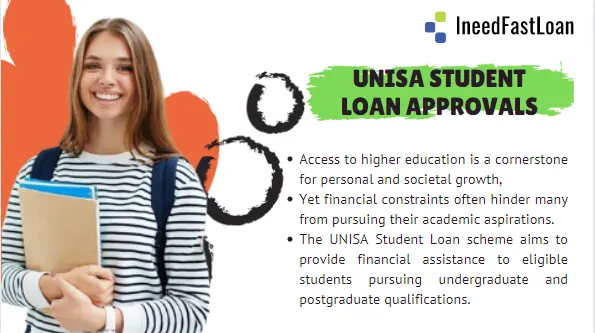How to You Can Get Unisa Student Loan Approvals

Access to higher education is a cornerstone for personal and societal growth, yet financial constraints often hinder many from pursuing their academic aspirations. Recognizing this, institutions like the University of South Africa (UNISA) offer student loans to assist learners in fulfilling their educational goals. However, navigating the application process and securing approval can be daunting for many. In this guide, we delve into the intricacies of UNISA student loans, elucidating the application process, eligibility criteria, and strategies to enhance your chances of approval.
What is UNISA student loans?
The University of South Africa (UNISA) student loan program is a financial assistance initiative aimed at supporting eligible students in pursuing their academic goals at UNISA. Administered by the National Student Financial Aid Scheme (NSFAS), these loans provide funding to cover tuition fees, prescribed books, and other essential expenses related to academic studies.
UNISA student loans are designed to alleviate the financial burden often associated with tertiary education, particularly for students from low-income households who may struggle to afford tuition fees and related costs. By offering favorable terms such as low interest rates and flexible repayment options, these loans enable students to focus on their studies without undue financial stress.
Why UNISA Student Loans
The UNISA Student Loan scheme aims to provide financial assistance to eligible students pursuing undergraduate and postgraduate qualifications. Administered by the National Student Financial Aid Scheme (NSFAS), these loans cover tuition fees, prescribed books, and other essential expenses related to academic studies. Unlike traditional bank loans, UNISA student loans are tailored to accommodate students from diverse socioeconomic backgrounds, offering favorable terms such as low interest rates and flexible repayment options.
Eligibility Criteria
Eligibility for UNISA student loans is contingent upon various factors, including South African citizenship or permanent residency, financial need, academic performance, enrollment in accredited UNISA programs, and compliance with NSFAS requirements. Applicants must undergo a thorough assessment process to determine their eligibility for loan approval.
The eligibility criteria typically include:
-
South African Citizenship or Permanent Residency:
To qualify for a UNISA student loan, applicants must either possess South African citizenship or maintain permanent residency status within the country. This criterion ensures that the loan program prioritizes individuals who have a substantial connection to South Africa, aligning with the aim of supporting local students in their pursuit of higher education. By restricting eligibility to South African citizens and permanent residents, the program seeks to foster a sense of national investment in education while also addressing the educational needs of individuals who have chosen South Africa as their long-term home. This requirement underscores the program’s commitment to equitable access to educational opportunities for those with a stake in the country’s future.
-
Financial Need:
While priority is accorded to applicants hailing from low-income households, UNISA’s student loan program also extends eligibility to middle-income families under certain conditions. This approach reflects a commitment to inclusivity and acknowledges that financial need can vary among families across the socioeconomic spectrum. Moreover, merit and individual financial circumstances play a pivotal role in determining eligibility, allowing for a nuanced assessment of each applicant’s situation. By considering both income levels and merit-based criteria, the program strives to support students from diverse backgrounds who demonstrate a genuine commitment to their academic pursuits. This balanced approach ensures that deserving individuals, regardless of their socioeconomic status, have access to the financial assistance needed to further their education and career prospects.
-
Academic Performance:
Academic merit, although not the sole factor, can significantly impact the approval process, particularly for postgraduate applicants. This means that while other considerations are taken into account, such as financial need and compliance with eligibility criteria, a strong academic record can bolster an applicant’s chances of securing a UNISA student loan, especially at the postgraduate level. This approach reflects the recognition of academic achievement as a valuable indicator of an applicant’s potential to excel in their chosen field of study and contribute meaningfully to their academic community. Therefore, applicants are encouraged to strive for academic excellence, as it can positively influence their eligibility and enhance their prospects of loan approval.
-
Enrollment Status:
Eligibility for UNISA student loans is exclusively reserved for students who are enrolled in accredited programs offered by the University of South Africa (UNISA). This requirement ensures that the financial assistance provided through the loan program is directed towards supporting students pursuing recognized and reputable courses of study. By limiting eligibility to accredited UNISA programs, the loan program maintains standards of quality and academic rigor, safeguarding the integrity of the educational experience for loan recipients. Therefore, prospective applicants must ensure that they are enrolled in accredited programs at UNISA to qualify for student loans and access the financial support necessary to pursue their academic aspirations.
-
Compliance with NSFAS Requirements:
To qualify for a UNISA student loan, applicants must adhere to the guidelines set forth by the National Student Financial Aid Scheme (NSFAS) and submit all required documentation accurately and promptly. Compliance with NSFAS guidelines ensures that applicants meet the necessary criteria for eligibility and facilitates a smooth and efficient processing of their loan applications. Timely and accurate submission of required documentation is crucial for ensuring that applicants’ financial needs are accurately assessed and that they receive the necessary financial assistance to pursue their academic goals. Therefore, applicants are encouraged to carefully review and follow the NSFAS guidelines and submit all required documentation in a timely manner to maximize their chances of loan approval.
Application Process
The application process for a UNISA student loan typically involves the following steps:
-
Preparation:
To apply for a UNISA student loan, it’s crucial to collect essential documents: proof of income, identification papers, academic transcripts, and any additional paperwork mandated by NSFAS. These documents provide vital information about the applicant’s financial situation, identity verification, academic history, and any specific requirements outlined by NSFAS. Gathering and submitting these documents accurately and promptly is imperative for a smooth and successful loan application process.
-
Online Application:
To initiate the application process for a UNISA student loan, visit either the NSFAS website or the UNISA student portal to access the online application form. It is essential to ensure that all information provided in the application is accurate and up-to-date. This includes personal details, academic history, financial information, and any other required documentation. By diligently verifying the accuracy of the information provided, applicants can avoid delays or complications in the application process and increase their chances of approval for a UNISA student loan.
-
Submission:
After completing the application form, it’s crucial to submit it along with all required supporting documents before the specified deadline. Late submissions can potentially jeopardize your chances of approval for a UNISA student loan. Therefore, it’s imperative to adhere to the designated deadline and ensure that all necessary paperwork is included with your application. This proactive approach demonstrates your commitment and responsibility, enhancing the likelihood of a successful loan application process.
-
Assessment:
NSFAS conducts a comprehensive assessment of every application, considering various factors including financial need, academic performance, and adherence to eligibility criteria. This thorough evaluation ensures that each applicant’s circumstances are carefully reviewed, enabling NSFAS to make informed decisions regarding loan approval. By assessing these key aspects, NSFAS aims to allocate financial assistance equitably and effectively, prioritizing those with genuine financial need, strong academic potential, and eligibility for support. Therefore, applicants should strive to provide accurate and comprehensive information to facilitate a fair and thorough evaluation process.
-
Approval:
Upon completing the evaluation process, successful applicants will receive notification of their loan approval status via email or postal mail. Approved students will be provided with a loan agreement detailing the terms and conditions of the loan. This agreement serves as a formal contract between the student and NSFAS, outlining repayment obligations, interest rates, and other pertinent information. It is essential for approved students to carefully review and understand the terms outlined in the loan agreement before proceeding with the disbursement of funds. This ensures transparency and mutual understanding between the borrower and the lending institution.
Tips for Securing Student Approval
Once approved, students receive a loan agreement outlining the terms and conditions of the loan, including repayment obligations and any applicable interest rates. Repayment typically commences after completing studies or securing employment, providing graduates with the opportunity to repay the loan based on their financial capacity.
Recommended: Maximizing Your 401k: Understanding Loan Interest Rates and When to Apply
While meeting the basic eligibility criteria is essential, there are several strategies you can employ to enhance your chances of approval for a UNISA student loan:
-
Maintain Academic Excellence:
Aim for academic excellence and showcase your dedication to your studies by maintaining consistent performance and actively participating in extracurricular activities. By striving for excellence in your academic pursuits and engaging in extracurricular endeavors, you not only demonstrate your commitment to personal growth but also highlight your well-roundedness and leadership potential. Academic achievements coupled with involvement in extracurricular activities portray a holistic picture of your capabilities and aspirations, enhancing your candidacy for a UNISA student loan. Therefore, prioritize both academic excellence and extracurricular engagement to bolster your application and showcase your readiness for higher education.
-
Submit Accurate Documentation:
It’s imperative to ensure that all required documentation is complete, accurate, and submitted within the specified deadlines when applying for a UNISA student loan. Incomplete or erroneous paperwork can significantly delay the application process or even result in rejection. Therefore, carefully review all documents to verify their completeness and accuracy before submission. Double-checking ensures that you have provided all necessary information and that it is free from errors or discrepancies. By meeting the documentation requirements and adhering to deadlines, you demonstrate your commitment and readiness to receive financial assistance, increasing the likelihood of a successful loan application.
-
Highlight Financial Need:
When applying for a UNISA student loan, it’s crucial to provide comprehensive details about your financial situation. This includes disclosing any extenuating circumstances that may affect your ability to fund your education independently. Such circumstances could include family financial difficulties, unexpected expenses, or personal challenges that impact your financial resources. By providing a thorough overview of your financial situation, including any challenges or hardships you may be facing, you enable NSFAS to make a more informed assessment of your eligibility for financial assistance. This transparency allows NSFAS to better understand your unique circumstances and provide the support you need to pursue your educational goals.
-
Seek Endorsements:
To strengthen your UNISA student loan application, consider obtaining letters of recommendation from teachers, employers, or community leaders. These letters should attest to your character, academic potential, and financial need, providing valuable insights into your suitability for financial assistance. A letter from a teacher can highlight your academic achievements and potential, while a recommendation from an employer can emphasize your work ethic and reliability. Additionally, a letter from a community leader can provide context regarding your personal circumstances and financial need. By gathering these letters of recommendation, you can present a well-rounded picture of yourself to NSFAS, enhancing your chances of approval for a UNISA student loan.
-
Stay Informed:
Stay informed about updates and announcements concerning UNISA student loans, including deadlines and eligibility criteria, to avoid missing out on important information. Keeping up-to-date with any changes or developments ensures that you are well-prepared and can take timely action when necessary. This may involve regularly checking the UNISA website, subscribing to newsletters or notifications, or following official social media channels for the latest updates. By staying informed, you can effectively plan and manage your application process, maximizing your chances of success in securing a UNISA student loan.
-
Appeal if Necessary:
If your application is rejected, you can explore the option of appealing the decision by providing additional documentation or clarification where necessary. This could involve submitting any relevant documents or information that may not have been included in the initial application or providing further explanation to address any concerns raised during the assessment process. By appealing the decision and providing additional evidence to support your case, you may have the opportunity to have your application reconsidered and potentially approved. It’s important to follow the appeal process outlined by NSFAS and ensure that all necessary steps are taken to present a strong and compelling case for reconsideration.
UNISA student loans play a vital role in promoting equitable access to higher education and empowering students to pursue their academic aspirations regardless of their financial circumstances.
Conclusion
Securing approval for a UNISA student loan is a pivotal step towards realizing your educational aspirations and advancing your career prospects. By understanding the intricacies of the application process, meeting eligibility criteria, and implementing strategic measures to strengthen your application, you can navigate the journey towards financial assistance with confidence and determination. Remember, persistence and preparation are key to unlocking the doors of opportunity that higher education affords.
Frequently Asked Questions (FAQs) Regarding UNISA Student Loans:
-
How do I apply for a UNISA student loan?
To apply for a UNISA student loan, you need to visit the National Student Financial Aid Scheme (NSFAS) website or access the application form through the UNISA student portal. Ensure you have all required documentation, such as proof of income, identification documents, and academic transcripts, and submit your application online before the specified deadline.
-
What expenses does a UNISA student loan cover?
UNISA student loans typically cover tuition fees, prescribed books, and other essential expenses directly related to academic studies. These loans aim to alleviate the financial burden on students and enable them to pursue their educational goals without undue hardship.
-
Am I eligible for a UNISA student loan if I’m not a South African citizen?
Generally, only South African citizens or individuals holding permanent residency status are eligible for UNISA student loans. However, certain exceptions may apply to international students or refugees with specific residency permits. It’s advisable to consult NSFAS or UNISA for clarification on eligibility criteria for non-citizens.
-
Can I apply for a UNISA student loan if I’m already receiving financial aid from another source?
Yes, you can still apply for a UNISA student loan even if you’re receiving financial assistance from other sources, such as scholarships, bursaries, or family support. However, you must disclose all sources of funding in your application and provide accurate information about your financial circumstances to NSFAS.
-
How long does it take to receive a decision on my UNISA student loan application?
The timeframe for receiving a decision on your UNISA student loan application can vary depending on factors such as the volume of applications, the completeness of your documentation, and the efficiency of the assessment process. Generally, NSFAS strives to process applications as expeditiously as possible, but applicants should anticipate a waiting period of several weeks to months.
-
What happens if my UNISA student loan application is rejected?
If your UNISA student loan application is rejected, you may have the option to appeal the decision by providing additional documentation or clarification to support your case. Alternatively, you can explore alternative funding options, such as part-time employment, private loans, or crowdfunding initiatives. It’s essential to remain proactive and seek assistance from UNISA’s financial aid office or student support services to explore viable solutions.






